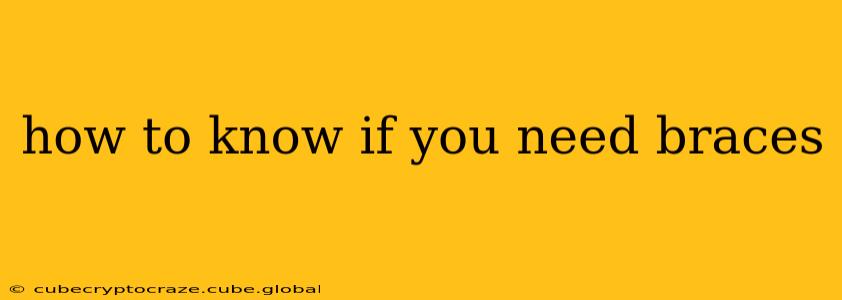Considering braces? It's a big decision, impacting both your appearance and oral health. This comprehensive guide will help you understand the signs that you might need orthodontic treatment. We'll explore common indicators, dispel some myths, and guide you through the process of getting a professional assessment.
What are the Signs I Might Need Braces?
Many factors contribute to the need for braces. It's not just about aesthetics; proper alignment is crucial for long-term oral health. Here are some key indicators:
- Overcrowding: If your teeth are too crowded, they may overlap, making it difficult to clean them properly and increasing the risk of cavities and gum disease. This is a common reason for seeking orthodontic treatment.
- Spacing: Gaps between teeth, while sometimes considered aesthetically pleasing by some, can also lead to difficulties in chewing and speaking, and may increase the risk of periodontal disease.
- Crossbite: This occurs when your upper teeth sit inside your lower teeth when you bite down. It can lead to uneven wear on your teeth and jaw problems.
- Underbite: An underbite is when your lower teeth extend out in front of your upper teeth. This can cause difficulties with chewing and jaw pain.
- Overbite: An overbite is when your upper teeth significantly overlap your lower teeth. Severe overbites can lead to damage to your teeth and gums.
- Open Bite: This is when there's a gap between your upper and lower front teeth when you bite down. It can affect your speech and chewing ability.
- Difficulty Chewing or Biting: If you consistently struggle to bite or chew food effectively, it could be a sign of misalignment requiring orthodontic intervention.
- Jaw Pain or Headaches: In some cases, misaligned teeth can lead to jaw pain, temporomandibular joint (TMJ) disorders, or even headaches. This is a significant indicator warranting professional evaluation.
- Speech Problems: Misaligned teeth can sometimes interfere with clear speech. Lisps or other speech impediments might necessitate orthodontic correction.
- Wear and Tear on Teeth: Uneven wear patterns on your teeth can result from a misaligned bite, suggesting a need for orthodontic intervention.
How Can I Tell if I Need Braces Just by Looking in the Mirror?
While a mirror can give you a general idea, self-diagnosis is unreliable. While you can observe overcrowding, spacing, or significant overbites/underbites, subtle misalignments are often invisible to the naked eye. A professional examination is crucial for accurate assessment.
What is the Best Age to Get Braces?
There's no single "best" age. Orthodontic treatment can be effective at various ages, from childhood to adulthood. Early intervention can sometimes prevent more complex issues later on, but adult orthodontics is increasingly common and highly successful. A consultation with an orthodontist is essential to determine the ideal timing for your specific circumstances.
Are Braces Only for Cosmetic Purposes?
No, braces are not solely for cosmetic reasons. While improving the appearance of your smile is a benefit, the primary function is to correct misalignments that can affect your oral health. Proper alignment facilitates easier cleaning, reduces the risk of cavities and gum disease, improves chewing efficiency, and can alleviate jaw pain.
What Happens During a Consultation with an Orthodontist?
During your consultation, the orthodontist will conduct a thorough examination of your teeth and jaw. This typically includes:
- Visual Examination: A visual assessment of your teeth and bite.
- X-rays: To reveal the position of your teeth and roots.
- Dental Impressions: To create a precise model of your teeth.
- Photos: To document your current condition.
Based on this assessment, the orthodontist will explain your treatment options and answer any questions you have.
How Much Do Braces Cost?
The cost of braces varies depending on several factors including the complexity of the case, the type of braces used (traditional metal braces, ceramic braces, Invisalign, etc.), and your location. It’s best to discuss costs directly with your orthodontist during your consultation.
Conclusion
Knowing if you need braces requires professional assessment. While you can observe some obvious signs yourself, a comprehensive examination by an orthodontist is vital for accurate diagnosis and effective treatment planning. Don't hesitate to schedule a consultation if you have any concerns about your teeth or bite. Your oral health and a confident smile are worth the investment.
